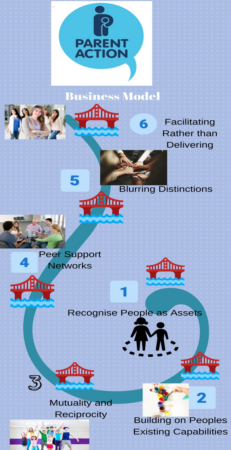Home Resources Project Reports Parent Action: Enabling, Advocacy, Empowering
Parent Action: Enabling, Advocacy, Empowering
| Leader(s) | Orla Watt, Sally McCabe and Sara Velasquez |
| Location | Northern Ireland |
| Duration | September 2014 – July 2016 |
| Received for Publication | December 2017 |
A UK wide family support organisation found that 70% of families raising children with disabilities in Northern Ireland felt they were socially isolated and that a lack of support from statutory services added to the child, young person and family’s social isolation (Contact a Family, 2011). “These families have to fight to get support, and often the support available is insufficient and/or inappropriate” (Department of Health, Social Services and Public Safety Northern Ireland (DHSSPSNI) (2012) p 21).
Parent Action (based in Northern Ireland) is a not-for-profit, charitable organisation which seeks to empower the parents of children and young people with disabilities/ serious long-term health conditions/continuing care needs, to advocate effectively for all their family members’ needs. Parent Action members believe that the empowerment of parent advocates is a journey, a process which has three elements; Enablement, Advocacy and Empowerment, and these elements constitute the ‘Parent Action Model’.
The project lead brought a group of parents together to meet regularly. Using practice development methods and skilled facilitation the group was able to work together collaboratively to explore values, beliefs and priorities from which a vision for the group was developed. They also worked together to co-design meaningful action plans and success criteria or a set of principles which now guide the planning and implementation of Parent Action services (Parent Action, 2017).
The parent experience evidence described in this report defines how the use of practice development methods (McCormack et al., 2013; Dewing et al., 2014), particularly person-centred facilitation (Harvey et al., 2002), enabled and empowered the parent participants in the project (and the project lead) to become more connected with the supports and resources in their local communities, ie their social capital increased. These outcomes for parents were recorded through continuous evaluation of the project, again using practice development methods, starting from the first meeting of the parent group.
This project was supported by Patients First, a partnership programme with the Burdett Trust for Nursing.
Comments are closed.


